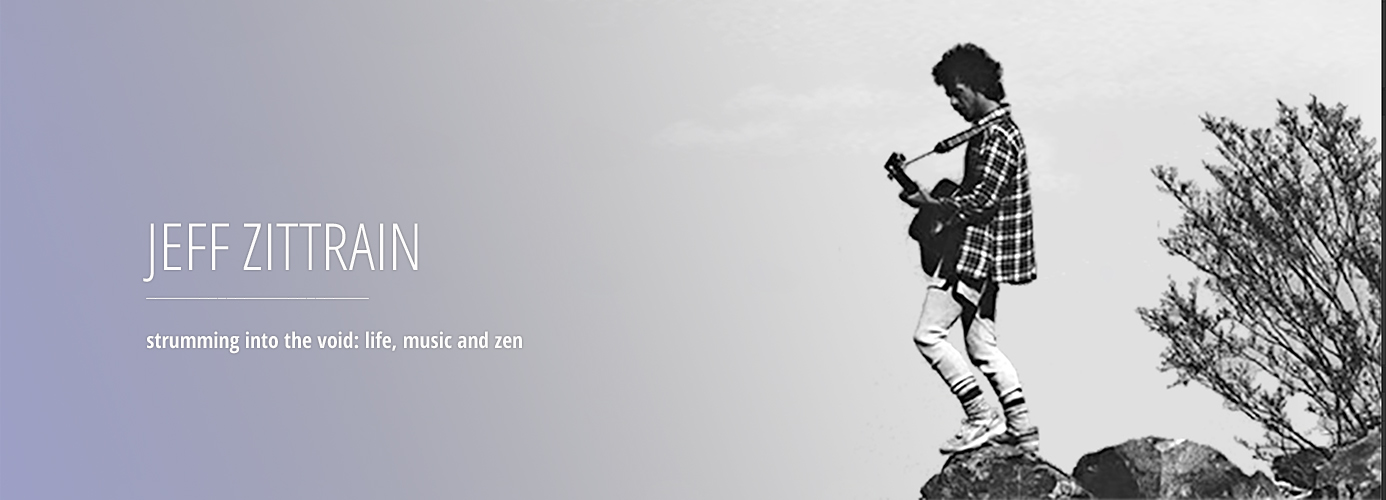
I’ve always had a soft spot in my psyche for the somewhat obscure song “Remember a Day” by keyboardist Rick Wright from Pink Floyd’s second album. A maze of swirling slide guitar, shimmering cymbals and general Floydian almost-cacophony, it seems like a lost nugget of psychedelia, reaching some of the most elemental questions of identity and time. Keep those musical cues in your head as you read the lyrics:
Remember a day before today
A day when you were young.
Free to play alone with time
Evening never came.
Sing a song that can’t be sung
Without the morning’s kiss
Queen – you shall be it if you wish
Look for your king
Why can’t we play today?
Why can’t we stay that way?
Climb your favorite apple tree
Try to catch the sun
Hide from your little brother’s gun
Dream yourself away
Why can’t we reach the sun?
Why can’t we blow the years away?
Blow away
Blow away
Remember
Remember
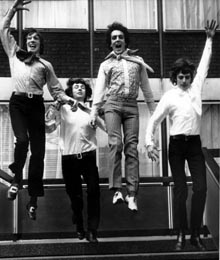
Pink Floyd, circa 1967 – remembering a day…
The song reminds me of those (I think Hindu) dioramas that show figures progressing through the cycle of life, from infant to child to adult to old person falling back into the ground. Which is the “you” in all of that? It’s obviously not just one of the individual figures so it must exist through all of them – and perhaps in the ones before birth and after death as well.

We connect with this when we think back to our earliest memories. Not only is “Remember a Day” about thinking about childhood, but it also has a childhood innocence about it (why can’t we play today, why can’t we stay that way?) – perhaps the influence of legendary Floyd founder Syd Barrett, who captured childhood trippiness in most of his songs, and really knocked the ball out of the playpen with the triumphant “Bike.”
One amazing thing about the Internet is how it can help us recapture all kinds of information and items that would just lay hidden and forgotten in earlier ages. Through the deft deployment of google, ebay, and amazon, I’ve been on a kick lately of “remembering a day” – that is, revisiting my own inner child by finding DVD’s of stuff I watched as a kid, but haven’t seen or even thought of consciously since then. And yet I’ve got very specific memories of some of it – which haven’t been tainted by repeated viewings in the intervening years.
One thing I stumbled upon from the recesses of my past is “UFO” – a British sci-fi series that lasted one season in 1970 (and was broadcast in the US in 1971). I clearly remembered watching the first episode of this new show on a Sunday night before school and I also remembered being affected by two episodes in particular. The rest was a blur. Through the aforementioned magic of computers, I found and bought the DVD set of the complete series and watched them recently.
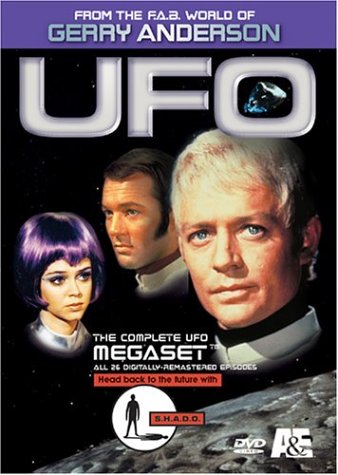
The show is not all that great (certainly not at the level of the original “Star Trek”) but it has a curious schizophrenic vibe, part Austin Powers-style swinging sixties (the opening theme music and sashaying mini-skirts will conjure visions of a dancing Mike Myers in your head) and part gloomy 2001: A Space Odyssey. It’s a kids’ show, with gadgets and space battles, yet it has a weird existential darkness to it. The first episode ends with a funeral and a somber voice-over meditation on the vastness of space. (This must have resonated with that sinking Sunday night feeling I used to get before the school week began…).
Unlike Star Trek, the non-human life forms are simply called “the aliens” and they are simply bad – faceless, silent boogymen who come to earth to capture or kill you. But perhaps more significantly, many of the episodes end on a down note, and the ending credits run over still shots of planets with ponderous, moody, decidedly non-Austin Powers music – the bleakness of outer space. I think this is what attracted me to the program as a kid – because it seemed serious and real.
In a telling twist, the two episodes that stuck with me both had connections (which my young mind didn’t fully comprehend) to the psychedelic scene. One opens with a character at a swinging party where “Get Back” is playing (and to which he flashes back during the episode), and the other features a young doctor who drops out of practice in protest over people killing each other, becomes a street musician, and takes psychedelics. (He then encounters some aliens, thinks he can fly, and jumps off a roof).
Now, did these plant something in me, or did they resonate with something already there?
Like I said, the ideas and writing of the show are not all that sophisticated, but the look of the show is compelling. Sylvia Anderson, the wife of the husband-wife team who created the show gets a prominent design credit of “21st Century Fashions” in the beginning of each episode and the characters do walk around in pristine mod jumpsuits like they’ve just gotten off a catwalk somewhere. The female operatives on the moon base wear identical purple wigs for reasons that are never explained, and the main male character has a striking white head of hair brushed in an odd fashion in front of his ears – but it all works.
And for a child, the visuals sometimes convey a lot even if the ideas are weak behind them.
Revisiting the series reminded me of a section in the autobiography of iconic Swiss psychologist Carl Jung, where he recounts repeatedly playing a game from his childhood as an adult and thereby journeys from the present back to his own childhood psyche. I was also reminded of another dark short story I read as a child called “Mimsy Were the Borogoves” in which two children receive a box of toys from the future which teach them non-Euclidean geometry – the story ends with them disappearing into an alternate reality.
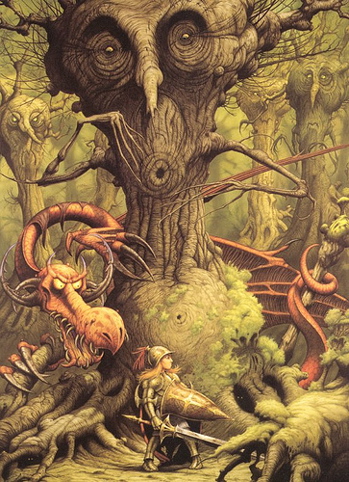
“All mimsy were the borogoves…”
The magical world of childhood – I think you’re brought back there by psychedelics – (Jefferson Airplane surely understood this with “White Rabbit,” their psychedelic ode to “Alice in Wonderland” – written by Lewis Carroll who also wrote “Jabberwocky” which supplied the title to “Mimsy Were the Borogoves”) – but I think it can then teach you of the world beyond your own individual life – that is, beyond linear thinking of life and death, beyond Euclidian geometry. Are we too jaded and hip for me to dare mention the final mind-blowing image of the fetus in 2001: A Space Odyssey – or, more daringly, Jimmy Page’s vision of himself through the stages of life (like the Hindu diorama) in The Song Remains the Same? Sacred or Silly? A Stairway to Heaven or just Dazed and Confused?
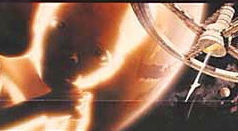
“Duhn…Duhn…Duhn…DuhnDuhn…”
Which is really the question of this column.
Rock music certainly went for the visionary in the sixties and seventies – the children heading into the mystic – after all, if we all call the tune, the piper will lead us to reason. And lest you think Stanley Kubrick or Led Zeppelin’s aspirations of transcendence border on the silly – how about the kid who gets the life-altering vision of a “big, gnarly eyeball” when he’s hit by Blue Oyster Cult’s lasers during the psychotic middle jam of “Don’t Fear the Reaper” in the 90’s movie about the 70’s called “The Stoned Age.”

Blue Oyster Cult, circa 1976
Yet maybe it’s just part of the yin/yang for the profound to appear stupid. The key to the universe is the laughter of the ancients, according to Hermann Hesse’s (not John Kay’s) Steppenwolf. Does anybody remember laughter? (Does anybody remember Robert Plant adding that line on the live album?) And isn’t Beavis’ chuckle part giddy and part knowing? Heh,heh…why don’t you come with me, little girl, on a magic carpet ride?

“The laughter of the ancients” – Beavis, mid-90s
I googled “Mimsy Were the Borogoves” and found it was written by Lewis Padgett (a pseudonym of Henry Kuttner and wife C.L. Moore) way back before I could have read it, in 1943 – but when I clicked on another link I immediately recognized the purple cover of the anthology in which I read it – the “Science Fiction Hall of Fame Vol. 1” – and therefore the year…1971…must have been between episodes of “UFO.”
Maybe Jung’s concept of synchronicity has something to it – the world is bound by secret knots – with one breath, with one flow, you will know…
To take what I have gathered from coincidence:
Kuttner spent most of his life in San Francisco and died of a heart attack at the tender age of (yikes) 43…
I also googled Gabrielle Drake, a beautiful purple-wigged actress on UFO, and discovered she was the sister of doomed folkie Nick Drake.
While searching for Jung’s game-playing episode in his autobiography, I discovered that Hermann Rorschach’s nickname in secondary school – long before he developed his famous test – was “Klex” meaning…“inkblot.”

“Hey Klex, did you do your algebra?”
Gets me thinkin’:
There’s this like, lattice o’ coincidence that lays on top of everything…suppose you’re thinkin’ about a plate of shrimp and somebody says “plate” or “shrimp” or “plate of shrimp” just out of the blue – it’s all part of the universal subconscious…
That’s from the philosophizing mechanic Miller in “Repo Man” – a translation of Jung’s synchronicity into (admittedly kind of insane) layman’s terms.
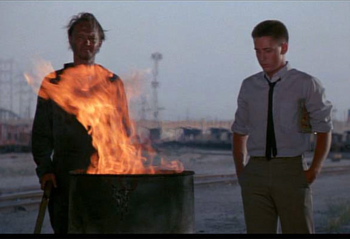
“There’s this like, lattice o’ coincidence…” Repo Man, 1984
But there’s something there…
Comin’ comin’ comin’ around in a circle. We have all been here before. Trapped by no track of hours for they hanged suspended. The note is eternal, I hear it, it sees me, forever we blend and forever we die. Everything under the sun is in tune but the sun is eclipsed by the moon.
See – I was able to bring it all back home (home again – I like to be here when I can) to Pink Floyd. But it’s not me – it’s the underlying pattern, the still point of the turning world, the revelations of the I Ching – (all movement is accomplished in six stages and the seventh brings return – change, return, success, going and coming without error) – whether you’re T.S. Eliot or living by the code of the Repo Man. We’re all playin’ in the band, experiencing both our part of the diorama and the whole diorama. There is no dark side of the moon, really. As a matter of fact, it’s all dark.
A fitting sentiment, by the way, to the dark end credits of UFO.
RIP Syd Barrett…
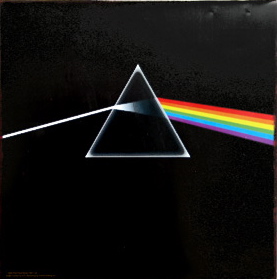

4 RESPONSES TO “ A STAIRWAY TO HEAVEN OR JUST DAZED AND CONFUSED? ”
- # 1 Sal Says: August 17th, 2006 at 7:41 am
- I come home from vacation and what do I find? The new RightAction. Happy days. First of I have to find a copy of Mimsy Were the Borogoves, sounds great.
- Secondly, intersting column if a bit wide-ranging. The segueways are brilliant but are you saying that their is no duality or that there is duality? I mean if it could be either option then there is a duality, right? Or is it like the trinity, right, two in one with no duality?
- # 2 Joe Says: August 18th, 2006 at 5:00 pm
- The column should be called Round and Round because you always wrap up the beginning and the end so tightly. And you’re catchphrase is Comin’ comin’ comin’ around in a circle. Cool stuff by the way.
- # 3 Jeff Says: August 20th, 2006 at 3:22 pm
- Now I get back from vacation and find some responses to the column – yay. I think I’m saying that dualities can blend into one which is a common theme of transcendence – and that last line from Dark Side of the Moon seems to fit well with that idea, in a dark, UFO way as well. I’m kind of fried coming back from my trip so if you want to ask again, feel free…
- thanks for the comments – Comin’ Around is definitely a theme that keeps comin’ around and might be a good title for the column!
- # 4 Dave TerpenySays: August 22nd, 2006 at 9:07 pm
- Hey Jeff, nice to see you on your trip. We’re coming around the mountain, here we come. We’re coming the round mountain, here we come…
